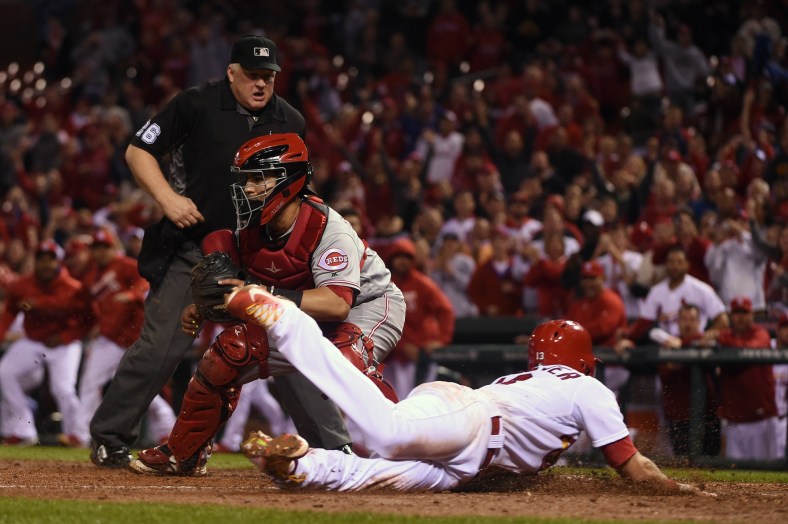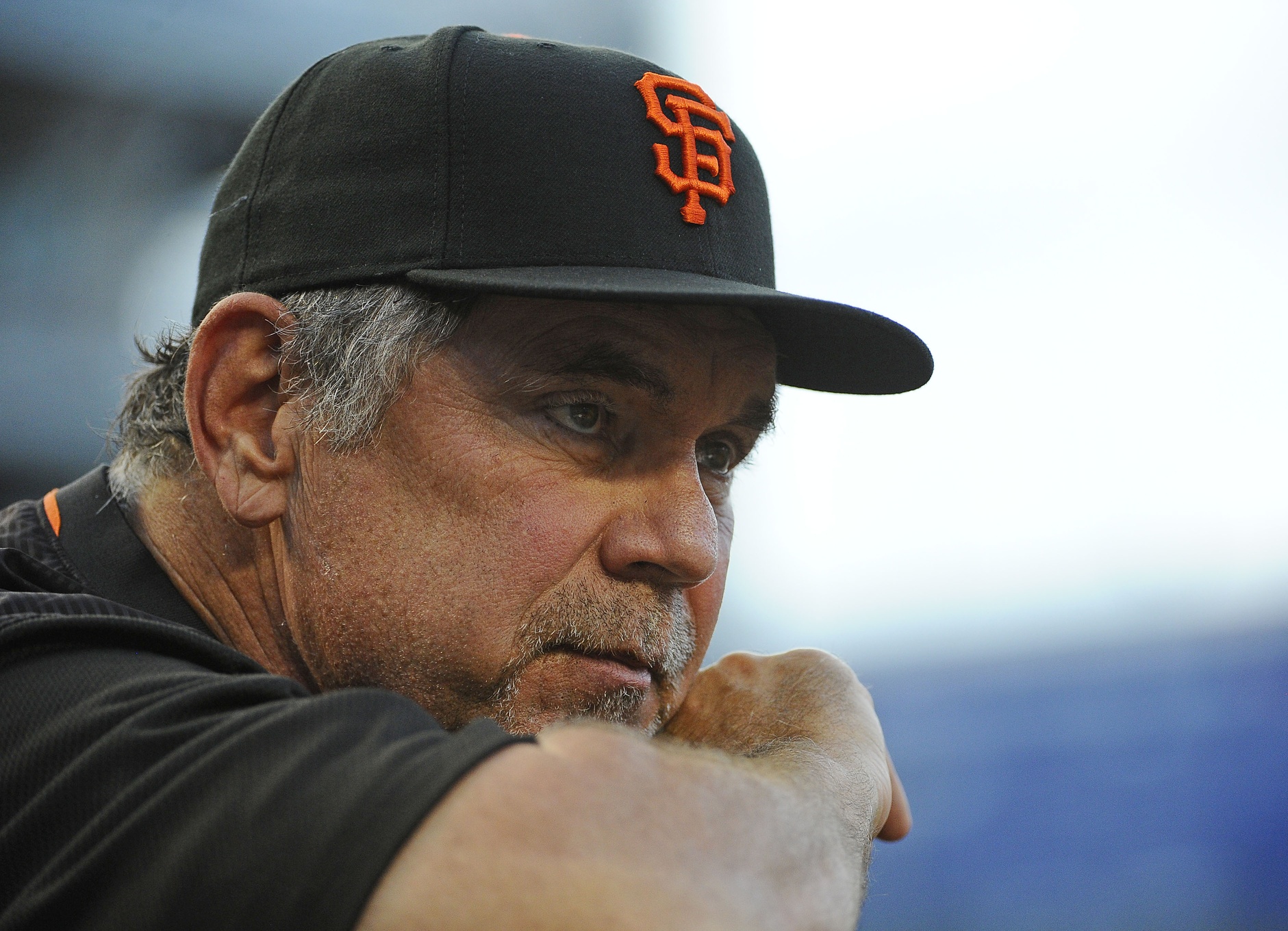
The end of Thursday’s game between the Cincinnati Reds and St. Louis Cardinals exposed a terrible rule in the MLB replay system.
The Cardinals won the game on a walk-off double from Yadier Molina that scored Matt Carpenter from first base.
It's a walk-off! #STLCards https://t.co/NNUIauOBuB
— St. Louis Cardinals (@Cardinals) September 30, 2016
The only problem is that replays showed that Molina’s double clearly bounced over the wall for what should have been a ground rule double. That would have left Carpenter at third.
Cincinnati manager Bryan Price decided that he wanted the play reviewed. Unfortunately for the Reds and San Francisco Giants — who are currently battling for a Wild Card spot with the Cardinals — Price didn’t decide quickly enough.
“Price was informed that, by rule, he lost his opportunity to challenge the call when he didn’t request a review immediately,” Jenifer Langosch of MLB.com said. “Unlike plays that end innings, where a manager has 10 seconds to alert the umpire he is considering a challenge and 30 seconds to decide, there is no grace period on a play that ends a game.”
Price would later call the rule in question a “terrible rule,” per Langosch. Quite frankly, he could not be more right.
This isn’t to say St. Louis fans should be defensive. The Cardinals are a better team than the Reds, were playing at home and should have had men on second and third with two outs.

The odds certainly favored St. Louis winning anyway, possibly as soon as the next pitch. Additionally, the Giants have also blown far too many games in 2016 to feel overly cheated by one that didn’t involve them.
That’s all undeniable.
But it’s also undeniable that by the rules, this game should not have ended on the play in question. It’s also undeniable that this exposed a real flaw in the MLB replay system.
The idea that a manager needs decide on a challenge quicker on an end of game call is simply ludicrous.
Let’s play this scenario out in reverse. Instead of the Cardinals winning the game in the bottom of the ninth inning, let’s say that the Reds took the lead on an identical play in the top of the inning. In that case, Mike Matheny and company would have plenty of time to decide the play.
But because it happened in the bottom of the inning, Price and the Reds are allotted less time?
When the replay rules were being drawn up, nobody foresaw this potential issue?
If anything, an end of game play should be given more time. This is true for a few reasons.
One, the importance of the situation. Unlike any other time during a game, we can clearly say that a bad call at the end of the game directly impacts the result. That doesn’t mean that St. Louis wouldn’t have won anyway. It does mean that the Reds didn’t get a chance that they should have gotten.
Two, one of the biggest issues with replay is that it impacts the pace of the game. In the middle of a game, managers sometimes seemingly take endless amounts of times deciding on whether to review plays. In many cases, the play in question isn’t even a potential scoring play.
When that happens, pitchers are potentially taken out of their rhythms. If it happens often enough over the course of nine innings, significant time is added to the game, ruining the flow. Mind you, that doesn’t even include the time it takes to actually replay the call itself.
At the end of the game, that’s not such a concern. If the game is over, there is no pace to worry about. If it’s not, or shouldn’t be (like Thursday), then getting the call right should be the top priority.
Baseball has used this replay system for three seasons now, or nearly 15,000 games. Quite frankly, it’s a wonder we haven’t seen this come up more often.
Unfortunately, there in lies another big problem. MLB is far less likely to implement any change unless it’s generating serious backlash.
That could come if the Cardinals end up beating or tying the Giants for the second wild card spot. But if San Francisco wins anyway, or loses by more than one game (not likely, but possible), this call becomes rather insignificant.
Even if the one game does impact the wild card chase, it’s still easy to dismiss this an outlier. This has happened once in three years. Who’s to say that the next time will come any sooner? Heck, it could come significantly later. When it does, it may not be and end of season game involving a contender. It could be a game in May between a couple of 72-90 teams.
Baseball simply can’t take that approach. The only point of replay is to get calls right. This is especially true at the end of games and in playoff races. That didn’t happen on Thursday.

Instead, the wrong call on a reviewable play was made and directly impacted the end of a game. Worse, while the umpires did acknowledge that they got the wrong afterwards, they really shifted the blame towards Price and the Reds.
“In this situation Bryan Price did not come up on the top step,” crew chief Bill Miller said, via Langosch. “We stayed there. I waited for my partners to come off the field. I looked into the dugout, the Cincinnati dugout, and Bryan Price made no eye contact with me whatsoever, and then, after 30 seconds, he finally realized — somebody must have told him what had happened — and we were walking off the field.”
Instead of holding firm to the letter of the rule, maybe Miller and the umpires should have honored the spirit of the rule and taken steps to get the call right.
Those steps could have included honoring Pryce’s request. They also could have included initiating an umpire review, which is legal at that point of that game.
Instead, Miller, while acknowledging the wrong call, still found a way to be stubborn and blame someone else. You couldn’t find a more stereotypical umpire quote if you spent hours digging through the archives.
Major League Baseball now has to do two things.
- Hope that the one game doesn’t matter. If the season ends in anything other than a Giants/Cardinals tie or the Cardinals winning by more than one game, MLB gets that wish.
- Regardless of whether that takes place, they must change the rule.
It may not be a frequent issue. It may be less frequent at the end of a season involving a team fighting for a playoff spot. Still, we know from Thursday that it can happen.
MLB needs to do everything in its power to see that it doesn’t happen again.